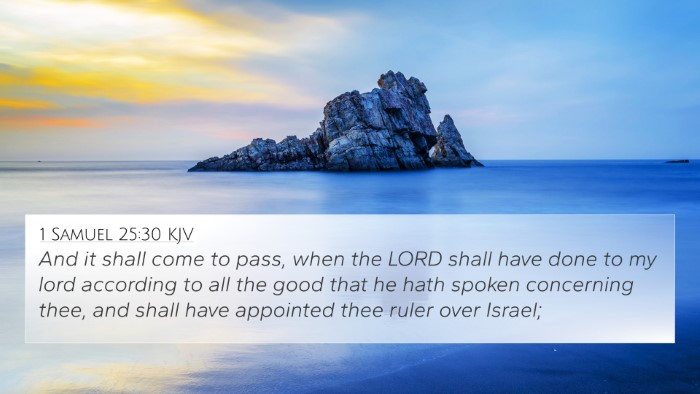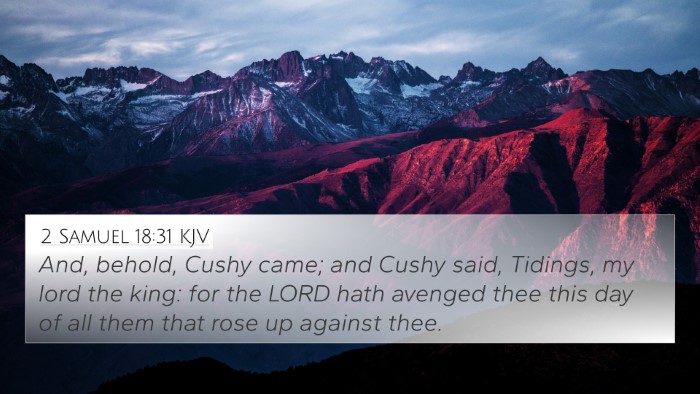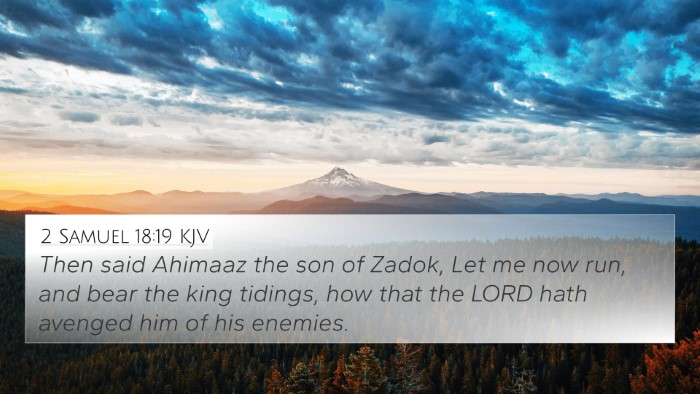Understanding 2 Samuel 22:48
Verse: "It is God that avengeth me, and that bringeth down the people under me."
Summary of Meaning
The verse from 2 Samuel 22:48 captures a profound expression of David’s recognition of God’s sovereignty in delivering him from his enemies. This statement emphasizes both God's protective nature and His role as a righteous judge who executes vengeance on behalf of His chosen ones.
Insights from Public Domain Commentaries
-
Matthew Henry:
Henry elaborates on the theme of divine justice, noting that David attributes his victories not merely to his own prowess but to God's intervention. The acknowledgment of God’s vengeance underscores the idea that the battle belongs to the Lord and reiterates the truth that He will fight for those who trust in Him.
-
Albert Barnes:
Barnes highlights the context of David's psalm, revealing how it reflects both gratitude and proclamation of God’s power in vanquishing adversaries. He points out that David's personal experience serves as a testament to the consistent nature of God, who fights on behalf of His faithful, contrasting with the world’s injustice.
-
Adam Clarke:
Clarke emphasizes the necessity of recognizing God's influence in every aspect of life, especially in warfare. He suggests that David’s words are a call to the faithful to trust in God's timing for vindication. Clarke notes the theological implications, indicating that God’s righteousness always prevails, and aligns with the greater narrative of divine retribution found throughout scripture.
Connections to Other Bible Verses
The understanding of 2 Samuel 22:48 can be enriched through various related scriptures. Here are some key cross-references:
- Psalm 18:47: "It is God that avengeth me, and subdueth the people under me." - A clear parallel expressing similar themes of divine vengeance.
- Romans 12:19: "Dearly beloved, avenge not yourselves, but rather give place unto wrath: for it is written, Vengeance is mine; I will repay, saith the Lord." - Reinforces God's authority over vengeance.
- Isaiah 63:4: "For the day of vengeance is in mine heart, and the year of my redeemed is come." - Highlights God's deliberate acts of vengeance.
- 2 Thessalonians 1:6: "Seeing it is a righteous thing with God to recompense tribulation to them that trouble you." - A New Testament affirmation of God's justice.
- Hebrews 10:30: "For we know him that hath said, Vengeance belongeth unto me; I will recompense, saith the Lord." - Echoing the Old Testament theme of divine vengeance.
- Micah 5:15: "And I will execute vengeance in anger and fury upon the heathen, such as they have not heard." - Contains the theme of God's retribution.
- Nahum 1:2: "God is jealous, and the Lord revengeth; the Lord revengeth and is furious." - Shows God's nature regarding vengeance.
Thematic Connections
The verse can also be seen in light of broader biblical themes:
- Divine Justice: Through various scriptures, we see the recurring motif of God's justice in addressing human wrongdoing and oppression.
- Faith and Trust: David expresses an unwavering faith that God is in control, an assurance echoed by many biblical authors.
- God's Sovereignty: The notion that God commands the outcomes of battles and personal struggles reiterates His supreme authority.
Tools for Bible Cross-Referencing
To analyze such connections effectively, consider using the following resources:
- Bible Concordance: A reference tool to identify key words and their occurrences throughout scripture.
- Bible Cross-Reference Guide: Helps trace themes and concepts across different scriptures.
- Cross-Reference Bible Study: Methods that involve examining parallels to deepen understanding.
- Bible Reference Resources: A collection of indices and guides to assist in scripture navigation.
Applying Cross-Referencing Techniques
To carry out a comparative Bible verse analysis, follow these steps:
- Identify key themes in the verse you are studying.
- Look up related scriptures using a Bible concordance or cross-reference tool.
- Observe how each verse contributes to the overarching theme and context.
- Take notes on insights that connect the verses.
Conclusion
2 Samuel 22:48 serves as a powerful reminder of God’s justice and wrath against those who oppose His people. By engaging with this verse through a variety of complementary scriptures and tools for cross-referencing, readers can gain a deeper understanding of the consistent message of God’s sovereignty throughout the Bible.










